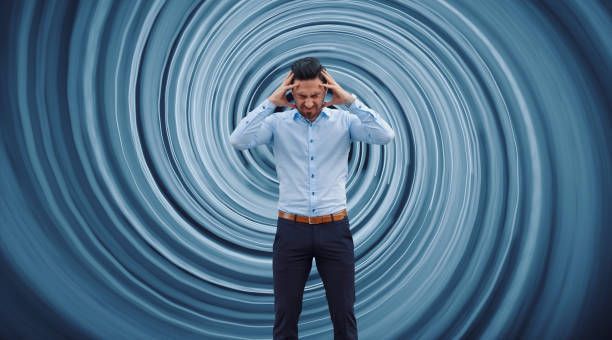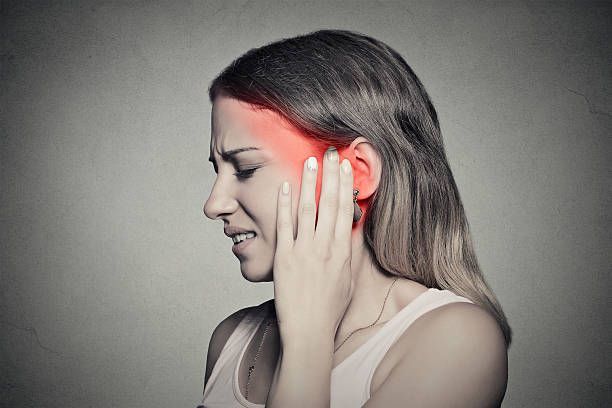Vertigo Causes and Relief: A Comprehensive Guide to Finding Relief
Matt Heistan • February 22, 2021

Have you ever experienced the sensation of feeling dizzy, lightheaded, or unsteady on your feet? If so, you may be one of the millions of people who suffer from vertigo - a condition that can be caused by a variety of factors, from inner ear problems to anxiety and stress.
The good news is that with proper diagnosis and treatment, vertigo can be managed and even cured in many cases. In this comprehensive guide, we'll explore the common causes of vertigo and the most effective cures, from lifestyle changes to medication and therapy.
Whether you're a first-time sufferer or a long-term vertigo patient, this guide will provide you with the information and resources you need to navigate this often debilitating condition and find lasting relief. So let's dive in and discover the causes and cures for vertigo!

Understanding Vertigo
Vertigo is a condition that causes a feeling of dizziness, lightheadedness, or spinning.
It is often described as feeling like the world around you is spinning or moving, even though you are standing still. Vertigo can be caused by a variety of factors, including inner ear disorders, migraines, head trauma, and more. The condition can be temporary or long-term, and its severity can range from mild to severe.
Vertigo is different from simple dizziness or lightheadedness. Dizziness is a feeling of being lightheaded or unsteady, whereas vertigo is a specific type of dizziness that causes a sensation of spinning or movement. While dizziness can be caused by many factors, vertigo is typically caused by a problem in the inner ear or the brain.
Vertigo can be classified into two types: peripheral and central vertigo. Peripheral vertigo is caused by a problem in the inner ear, while central vertigo is caused by a problem in the brain.
Peripheral vertigo is the most common type and is often caused by conditions such as benign paroxysmal positional vertigo (BPPV), Meniere's disease, and vestibular neuritis. Central vertigo is less common and is often caused by conditions such as a stroke or a brain injury.
Causes of Vertigo
Vertigo can be caused by a variety of factors, including inner ear disorders, migraines, head trauma, and more. Inner ear disorders are the most common cause of vertigo and include conditions such as BPPV, Meniere's disease, and vestibular neuritis.
BPPV
BPPV is caused by small calcium crystals that become loose in the inner ear and cause dizziness and vertigo. Physical therapy is often used to treat BPPV, as well as medications such as meclizine or anticholinergics. Motion sickness medications such as dimenhydrinate or promethazine can also help to reduce the symptoms of BPPV.
Meniere's Disease
Meniere's disease is caused by a buildup of fluid in the inner ear, which can cause vertigo, hearing loss, and tinnitus. Ear pain and a feeling of fullness in the affected ear may also occur.
Treatment for Meniere's disease includes medications to reduce the amount of fluid in the inner ear, as well as lifestyle changes such as reducing salt intake and avoiding loud noises.
Vestibular Neuritis
Vestibular neuritis is caused by inflammation of the nerve that connects the inner ear to the brain and can cause severe vertigo and dizziness. The vestibular nerve is responsible for providing the body with balance and spatial orientation.

Migraines
Migraines can also cause vertigo, as they can interfere with the balance centers in the brain. This happens when the vestibular system is affected by the migraine, causing a sense of spinning or movement.
Head Trauma
Head trauma, such as a concussion or other injury to the head or neck, can cause vertigo due to damage to the inner ear or to the balance centers in the brain. This can cause balance problems and a feeling of dizziness or spinning.
Anxiety and Stress
Stress and anxiety can also cause vertigo due to an increase in adrenaline levels. This type of vertigo is typically temporary and not indicative of a larger underlying issue.
Symptoms of Vertigo
The symptoms of vertigo can be quite debilitating and include dizziness, lightheadedness, and a feeling of spinning or movement. Other symptoms can include nausea, vomiting, and sweating.
The severity of the symptoms can vary from person to person and can range from mild to severe. Some people may experience only occasional episodes of vertigo, while others may experience it on a regular basis.
Inner ear disorder-related vertigo typically lasts between a few seconds and several minutes. Migraine-induced vertigo can last anywhere from minutes to hours, while vertigo caused by head trauma or anxiety can last for an extended period of time.
Because vertigo can be caused by a variety of factors, it's important to pay attention to any other symptoms you may be experiencing. For example, if you have a history of migraines and are experiencing vertigo, you may also experience headaches, visual disturbances, or sensitivity to light and sound.
If you're experiencing vertigo along with other symptoms, it's important to see a healthcare provider for a proper diagnosis.

Diagnosing Vertigo
Your central nervous system is responsible for controlling your balance and coordination, so a doctor will typically start with a neurological exam to check for any issues. The doctor may also order imaging tests, such as an MRI or CT scan, to rule out any underlying conditions.
Diagnosing vertigo can be challenging because it can be caused by a variety of factors. A healthcare provider will typically start by taking a detailed medical history and conducting a physical exam. They may also perform a series of tests to help determine the cause of your vertigo.
One common test used to diagnose vertigo is the Dix-Hallpike test. This test involves moving your head and body into different positions to see if it triggers vertigo. Another test that may be used is the electronystagmography (ENG) test, which measures eye movements to help determine the cause of your vertigo.
In some cases, imaging tests such as an MRI or CT scan may be needed to rule out other underlying conditions that may be causing your vertigo.
What Is Benign Paroxysmal Positional Vertigo?
Often referred to as BPPV, benign paroxysmal positional vertigo causes dizziness that grows worse when you change the position of your head by getting out of bed, standing up after sitting on the couch or looking down suddenly. The symptoms of vertigo may include:
- A sense that everything around you is moving.
- Unsteadiness or imbalance.
- Vomiting and nausea.
- Symptoms usually only last a short time, and they can stay away for quite a while before recurring. While a head position change can spark the symptoms, you may also feel uncomfortable when walking or standing.
Abnormal rhythmic eye movements may also occur. BPPV is most common among people over 50, and it happens more with women than men. Though you may feel uncomfortable during BPPV, most cases do not have any serious complications. You do need to be careful of falling.
Be sure to seek emergency treatment if you get a fever, a severe headache, lose your hearing or have trouble walking. These might indicate a more serious issue.
Diet and Lifestyle Changes for Vertigo Management
Diet and lifestyle changes can also be effective in managing vertigo. For example, reducing salt intake can help reduce fluid buildup in the inner ear, which can help reduce symptoms of vertigo. Getting enough sleep and reducing stress can also help manage vertigo symptoms.
Some people may also benefit from dietary supplements such as magnesium, which can help reduce inflammation in the body and improve balance. It's important to talk to a healthcare provider before starting any new supplements or making significant changes to your diet and lifestyle.
Treatment Options for Vertigo
Vertigo treatment will depend on the underlying cause of the condition. In many cases, vertigo can be managed with medication, therapy, and home remedies.
Medications used to treat vertigo include antihistamines, anti-nausea medications, and benzodiazepines. Therapy for vertigo may include vestibular rehabilitation, which involves exercises to help improve balance and reduce dizziness.
Home remedies can also be effective in managing vertigo. For example, the Brandt-Daroff, Semont, and Epley maneuvers are exercises that can be done at home to help reduce symptoms of vertigo. These exercises involve moving your head and body in specific ways to help reposition the calcium crystals in your inner ear.

How Can IV Therapy Help?
Intravenous (IV) therapy can be a helpful part of managing vertigo. IV therapy can be used to provide vitamins, minerals, and fluids that can help improve balance and reduce dizziness. It can also help your body fight off infections and reduce inflammation in the inner ear, which can help control vertigo symptoms.
If you are experiencing vertigo, it's important to talk to your healthcare provider about the best treatment plan for you. They can help you determine if IV therapy is an appropriate option for managing your symptoms. It's also important to follow their instructions on home remedies and lifestyle changes that can reduce symptoms of vertigo.
Relieve the Symptoms of Vertigo With an Anti-Nausea IV
You can relieve symptoms of vertigo by ordering an anti-nausea IV from AZ IV Medics. Our IVs restore your balance of vitamins, minerals and electrolytes, helping you feel better during a bout of vertigo.
We come to you, so you don't have to worry about driving when you're not feeling your best. Book an appointment online today, and our team can be at your house within an hour.
Conclusion
Vertigo can be a challenging condition to live with, but with proper diagnosis and treatment, it can be managed and even cured in many cases.
Understanding the common causes of vertigo and the most effective cures, from medication and therapy to home remedies and lifestyle changes, can help you find lasting relief from this often debilitating condition.
Whether you're a first-time sufferer or a long-term vertigo patient, there are resources and strategies available to help you navigate vertigo and find relief.










